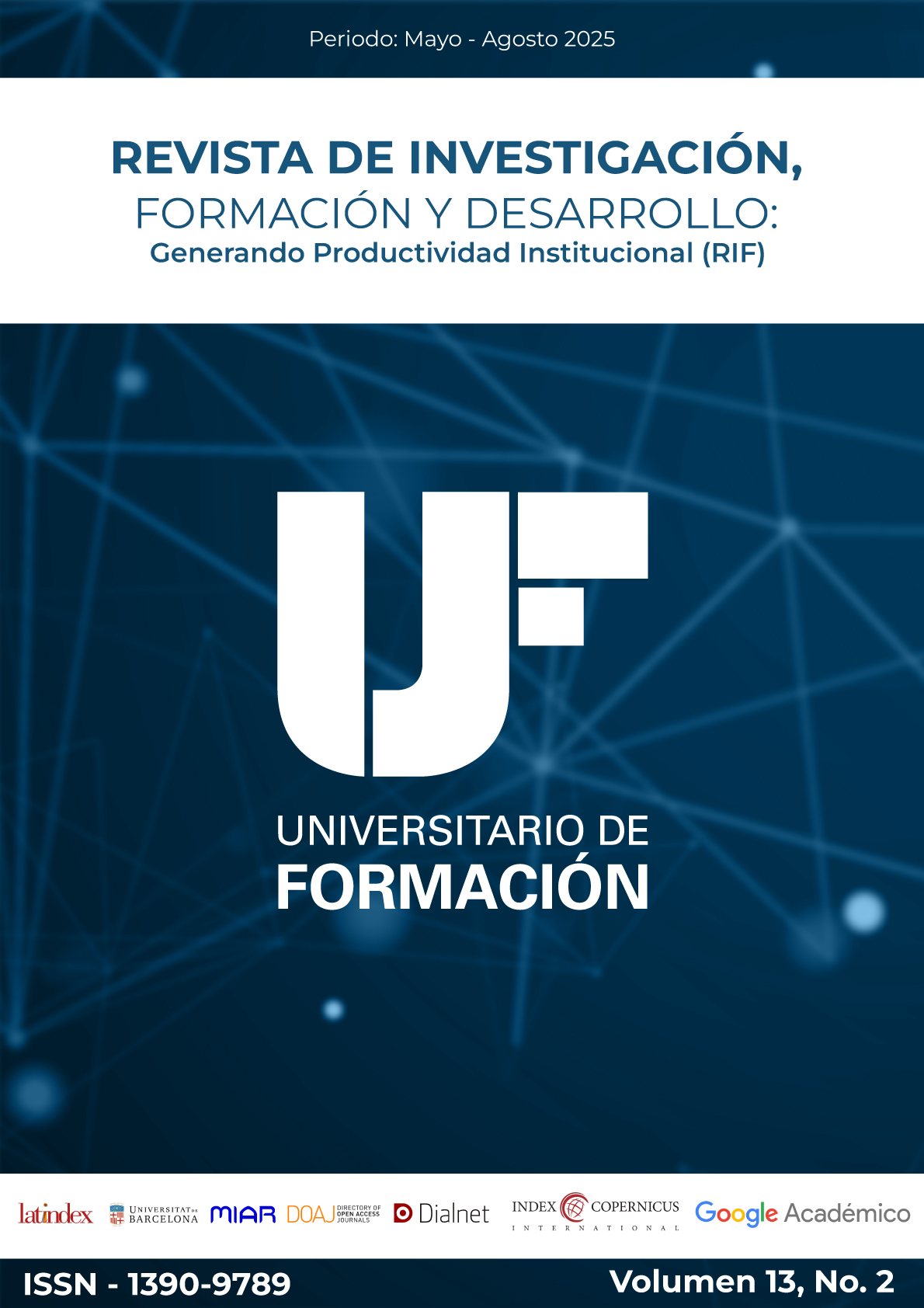Global Citizenship Education as an Interdisciplinary Framework: Challenges and Projections for Educative Innovation
Main Article Content
Abstract
Global Citizenship Education (GCED) has gained prominence as an educational response to pressing global challenges such as climate change, social inequality, and cultural conflicts. This essay is grounded in the need to promote an interdisciplinary educational framework that fosters critical, empathetic, and socially responsible learners committed to sustainable development. Its main objective is to examine GCED as an interdisciplinary approach capable of transforming educational models and enriching teacher training. The study follows a theoretical-documentary methodology, drawing on recent academic literature (2015–2024) and the analysis of international and Latin American experiences. Findings highlight that GCED enhances holistic and meaningful learning by integrating perspectives from various disciplines, aligning with the Sustainable Development Goals (SDGs). However, key barriers to its implementation are identified, including limited teacher preparation, rigid curricula, and tensions between traditional and transformative pedagogical practices. The essay concludes that GCED, understood as an interdisciplinary framework, contributes to educational innovation and to the development of inclusive policies, didactic strategies, and research agendas focused on preparing globally conscious citizens within local educational contexts.
Article Details

This work is licensed under a Creative Commons Attribution-NonCommercial-ShareAlike 4.0 International License.
Este trabajo tiene licencia DE Atribución/Reconocimiento-NoComercial-CompartirIgual 4.0 Internacional. CC BY-NC-SA 4.0.
How to Cite
References
Ahsan, S., Khairul, M., Hasan, R. (2024) Scope of Global Citizenship Education in the National Curriculum Framework 2021 of Bangladesh: A critical Review. Teacher’s World: Journal of Education and Research, 49(1), 49–76. https://doi.org/10.3329/twjer.v49i1.70238
Al’Abri, K.M.; Ambusaidi, A.K.; Alhadi, B.R. (2022) Promoting Global Citizenship Education (GCED) in the Sultanate of Oman: An Analysis of National Policies. Sustainability,14(12). https://doi.org/10.3390/su14127140
Amin, H., Zaman, A., & Tok, E. (2023). Education for sustainable development and global citizenship education in the GCC: a systematic literature review. Globalisation, Societies and Education, 1–16. https://doi.org/10.1080/14767724.2023.2265846
Arenal Lora, L. & Prieto Jiménez, E. (2020). Educación para la Ciudadanía Global (ECG). en Dominguez Diaz, F. A. & Arenal Lora, L. (Eds) Estudios contemporáneos sobre geopolítica, conflictos armados y cooperación internacional, 513-532. Recuperado de: http://hdl.handle.net/10334/5599
Bourn, D., Hunt, F. & Bamber, P. (2017). A review of education for sustainable development and global citizenship education in teacher education. UNESCO Publishing
Chung, B.G. & Park, I. (2016). A Review of the Differences between ESD and GCED in SDGs: Focusing on the Concepts of Global Citizenship Education. Journal of international cooperation in education, 18(2), 17-35. https://doi.org/10.15027/43795
Curtis, W., Ward, S., Sharp, J., Hankin, L., Su, F., Bullivant, A. & Holt, V. (2014). Global citizenship education. En Curtis, W., Ward, S. & Hankin, L. (Eds) Education Studies: An Issues-based Approach (3a Edición), 231-244. SAGE Publications, Inc., https://doi.org/10.4135/9781526435705
De Poorter, J., Aguilar-Forero, N. (2020) The emergence of global citizenship education in Colombia: lessons learned from existing education policy. Compare: A Journal of Comparative and International Education, 50(6), 865-883 https://doi.org/10.1080/03057925.2019.1574558
Dorji, Y. (2024). Integration of Global Citizenship Education (GCED) into Bhutan’s Curriculum: In-Depth Analysis, Alignment and Enrichment of GNH as a Framework. International Journal of Research and Innovation in Social Science, 8(9), 1142-1157. https://doi.org/10.47772/ijriss.2024.809097
Fischman, G.E. & Estélles, M. (2020). Global Citizenship Education in Teacher Education. Routledge. https://doi.org/10.4324/9781351129848-6
Goh, M. & Deutschman, M. (2020). Global Citizenship Education in East, South, and Southeast Asia. In D. Shugurensky & C. C. Wolhuter (Eds.) Global Citizenship Education and Teacher Education: Theoretical and Practical Issues, 161-178. Routledge. https://doi.org/10.4324/9781351129848-9
Heo, Y., Kim, N.E., & Chae, J. (2021). Exploring the Objectives and Contents of Global Citizenship Education in the NSFCS 3.0: Focusing on the View of the ‘World’ and the Keywords. Korean Home Economics Education Association, 33(3), 107-127. https://doi.org/10.19031/jkheea.2021.9.33.3.107
How, M. (2021) Artificial Intelligence for Social Good in Responsible Global Citizenship Education: An Inclusive Democratized Low-Code Approach. 2nd World Conference of Teaching and Education, 81-89. https://doi.org/10.33422/2nd.worldcte.2021.01.08
Lenoir, Y., Hasni, A., & Froelich, A. (2015). Curricular and Didactic Conceptions of Interdisciplinarity in the Field of Education: A Socio-Historical Perspective. Issues in Interdisciplinary Studies, 33, 33-93.
Meylani, R. (2024). A Comparative Analysis of Traditional and Modern Approaches to Assessment and Evaluation in Education. Batı Anadolu Eğitim Bilimleri Dergisi, 15(1), 520-555. https://doi.org/10.51460/baebd.1386737
Mishra, A., & Srivastava, A. (2024). Fostering Skills for Global Citizenship through Teacher Education in India. International Journal For Multidisciplinary Research, 6(2). https://doi.org/10.36948/ijfmr.2024.v06i02.25769
Mochizuki, Y. (2016). Educating for Transforming Our World: Revisiting International Debates Surrounding Education for Sustainable Development. Current Issues in Comparative Education, 19(1), 109-125. https://doi.org/10.52214/cice.v19i1.11538
Mulyani, H., Komalasari, K., Permatasari, M., Bribin, M., Suriaman S. (2024) Transformasi Pendidikan Kewarganegaraan Global di Era Abad 21: Analisis Implementasi dan Tantangan. Jurnal Kewarganegaraan, 21(1), 88-101
Raveendran, A. (2021). Improving Quality of Life through Global Citizenship Education (GCED). In Tripathi, S., Rai, R. & Van Rompay-Bartels, I. (Eds) Quality of Life. https://doi.org/10.1201/9781003009139-5
Reynolds, R., MacQueen, S. and Ferguson-Patrick, K. (2019). Educating for global citizenship: Australia as a case study. International Journal of Development Education and Global Learning, 11(1), 103–19. https://doi.org/10.18546/IJDEGL.11.1.07
Reysen, S., & Katzarska-Miller, I. (2013). A model of global citizenship: antecedents and outcomes. International journal of psychology: Journal international de psychologie, 48(5), 858-70. https://doi.org/10.1080/00207594.2012.701749
Shin, J.E., Rhee, E.K., An, S., Kang, Y., Lee, K., & Song, I.H. (2024). Establishing the ESD and GCEd system in higher education: Analyzing the holistic approach of Yonsei University in South Korea. IGEE Proceedings, 1(1), 6-19. https://doi.org/10.69841/igee.2024.002
Sriraman, B., & Roscoe, M.B. (2015). Interdisciplinary perspectives to the development of high ability in the 21th century. International Journal for Talent Development and Creativity, 3(2) 1-6.
Son, S.K. (2021). The Case for Christian Global Citizenship Education. Theology and Praxis, 75, 389-412. https://doi.org/10.14387/jkspth.2021.75.389
Suhodimtseva, A.P., Vorozheikina, N.I., & Eremina, J.B. (2018). Integration Approach to Solving Problems of Interdisciplinary Nature in the Conditions of Post-industrial Education. Smart Technologies and Innovations in Design for Control of Technological Processes and Objects: Economy and Production, 138, 501-510. https://doi.org/10.1007/978-3-030-15577-3_48
Torres, C. A. (2017). Theoretical and Empirical Foundations of Critical Global Citizenship Education (1st ed.). Routledge. https://doi.org/10.4324/9781315452579
UNESCO (2015). Global Citizenship Education: Topics and Learning Objectives. UNESCO. https://doi.org/10.54675/DRHC3544
UNESCO. (2021). Reimagining Our Futures Together: A New Social Contract for Education. UNESCO Publishing.

